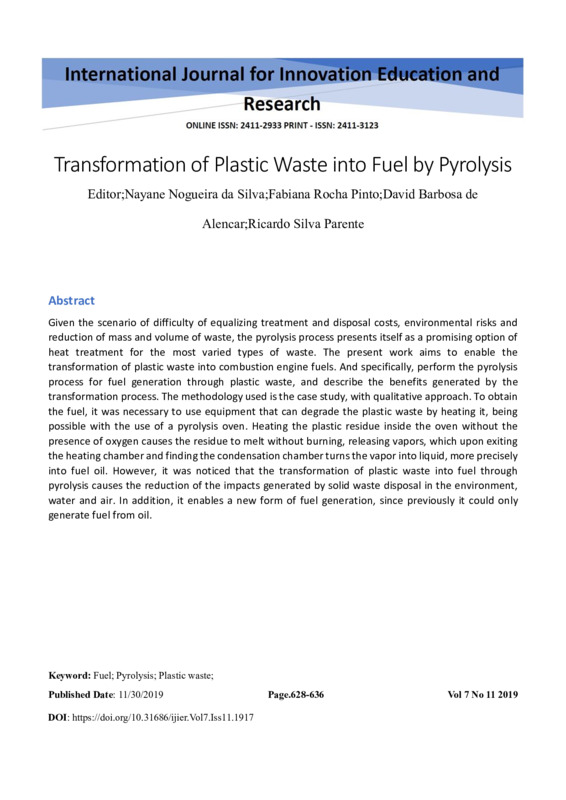Transformation of Plastic Waste into Fuel by Pyrolysis
Item
-
Tipo do ITEM
-
Artigo Ciêntifico
-
Título do Artigo
-
Transformation of Plastic Waste into Fuel by Pyrolysis
-
Descrição
-
Abstract
Given the scenario of difficulty of equalizing treatment and disposal costs, environmental risks and
reduction of mass and volume of waste, the pyrolysis process presents itself as a promising option of
heat treatment for the most varied types of waste. The present work aims to enable the
transformation of plastic waste into combustion engine fuels. And specifically, perform the pyrolysis
process for fuel generation through plastic waste, and describe the benefits generated by the
transformation process. The methodology used is the case study, with qualitative approach. To obtain
the fuel, it was necessary to use equipment that can degrade the plastic waste by heating it, being
possible with the use of a pyrolysis oven. Heating the plastic residue inside the oven without the
presence of oxygen causes the residue to melt without burning, releasing vapors, which upon exiting
the heating chamber and finding the condensation chamber turns the vapor into liquid, more precisely
into fuel oil. However, it was noticed that the transformation of plastic waste into fuel through
pyrolysis causes the reduction of the impacts generated by solid waste disposal in the environment,
water and air. In addition, it enables a new form of fuel generation, since previously it could only
generate fuel from oil.
Keyword: Fuel; Pyrolysis; Plastic waste;
-
Abstract
-
Abstract
Given the scenario of difficulty of equalizing treatment and disposal costs, environmental risks and
reduction of mass and volume of waste, the pyrolysis process presents itself as a promising option of
heat treatment for the most varied types of waste. The present work aims to enable the
transformation of plastic waste into combustion engine fuels. And specifically, perform the pyrolysis
process for fuel generation through plastic waste, and describe the benefits generated by the
transformation process. The methodology used is the case study, with qualitative approach. To obtain
the fuel, it was necessary to use equipment that can degrade the plastic waste by heating it, being
possible with the use of a pyrolysis oven. Heating the plastic residue inside the oven without the
presence of oxygen causes the residue to melt without burning, releasing vapors, which upon exiting
the heating chamber and finding the condensation chamber turns the vapor into liquid, more precisely
into fuel oil. However, it was noticed that the transformation of plastic waste into fuel through
pyrolysis causes the reduction of the impacts generated by solid waste disposal in the environment,
water and air. In addition, it enables a new form of fuel generation, since previously it could only
generate fuel from oil.
Keyword: Fuel; Pyrolysis; Plastic waste;
-
Língua do arquivo
-
inglês
-
Data da Publicação
-
Ano 2019
-
Palavra-chave
-
Fuel
-
Pyrolysis
-
Plastic waste
-
Autores
-
Nayane Nogueira da Silva
-
Fabiana Rocha Pinto
-
David Barbosa de Alencar
-
Ricardo Silva Parente
-
Local
-
ITEGAM - Manaus, 2019


